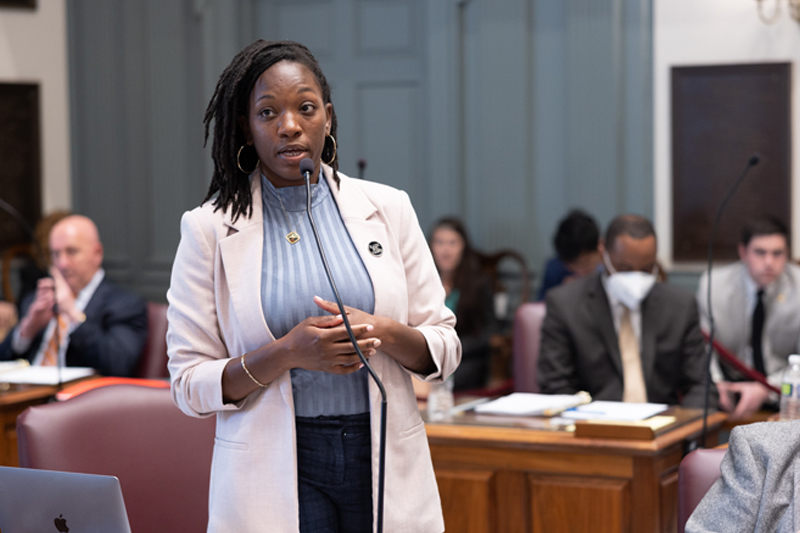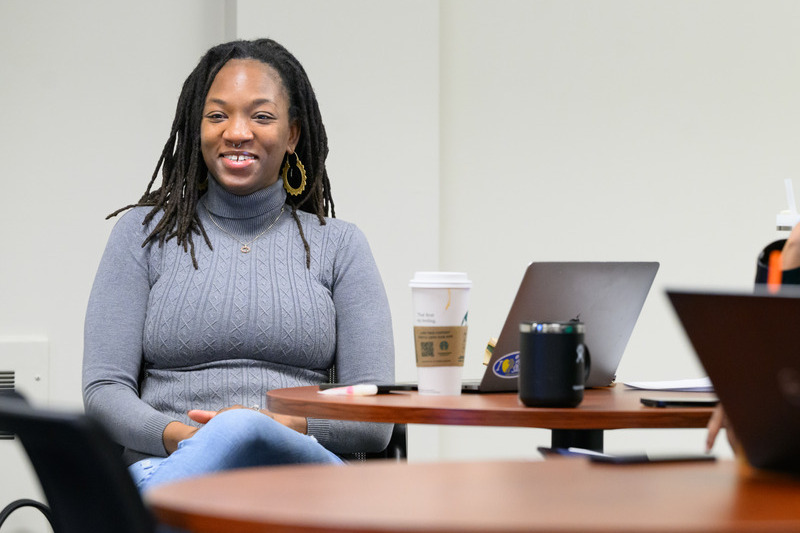


Making change for Delaware
Photos by Evan Krape and courtesy of Delaware Senate Democrats March 28, 2024
Africana studies graduate student Marie Pinkney embraces challenges in state politics and in the classroom
When Marie Pinkney was elected to the Delaware State Senate in 2020, she had never stepped inside Legislative Hall in the state capital. Despite being new to politics, Pinkney believed she had something to offer, and she was motivated to do something to help move the state forward. Three years later, this willingness to embrace challenges brought Pinkney to the University of Delaware, where she began the master of arts in Africana studies program.
The two pursuits make sense for Pinkney.
“I’m interested in policy because it has been used historically to disenfranchise minority communities, particularly Black communities,” she said. “I’m hoping the Africana studies degree will help me find creative ways to enfranchise these same communities.”
Pinkney has been interested in exploring Africana studies for a long time. The interdisciplinary field examines the Black experience through social, economic and institutional structures, and learning more about it can inform a politician’s decision-making process.
The lessons aren’t all she’s taking away from the program. During her first semester, she learned that to be a successful policymaker, she would need to adjust her writing style. She had always been a strong creative writer, but didn’t have as much experience with research-based writing, a skill that could help her advance her causes in the Senate.
“A lot of what I do focuses on everyday stories and experiences, but some people strictly care about the research behind legislation,” she said. “Learning when and how to take emotion and creativity out of it while keeping a proposal engaging is a challenge, but a welcome challenge.”
A change maker
Working to improve her community and help those around her comes naturally to Pinkney. After earning a master of social work from Delaware State, she worked in adolescent mental health and substance abuse at a private facility then took a position in the surgical ICU at ChristianaCare, Delaware’s only level one trauma center, where she witnessed the area’s most severe injuries from car accidents, burns and falls. What bothered Pinkney the most was seeing gunshot victims come through the ICU.
“There was not a week that would go by without a Black teenage boy in the ICU from a gunshot. We would help one patient at a time, but inevitably another would come through. It felt like I was putting a BandAid on a situation that needed a tourniquet,” she said.
In 2019, gun-control legislation failed to make it out of a committee headed by the District 13 incumbent David McBride, who had served for more than 40 years. Pinkney was angry that her representative didn’t do more to protect her patients from gun violence, and she decided to act by running in the next Delaware State Senate election. She beat McBride in the Democratic primary the following year, then went on to win the seat in the general election.
“I was very green. Politics was not my background. Social workers work on a micro level with one patient at a time, but we are also pretty determined people, and when there is a problem we figure out a solution,” she said.
The civil unrest and pandemic stress of 2020 created an environment where freshman politicians immediately got to work on substantive issues like gun control, police use of force, probation reform and healthcare access. Pinkney is particularly proud of sponsoring Bill 316 capping the cost of diabetic supplies.
Her life outside the classroom is making an impact on those around her in the classroom. Associate Professor Durell Callier, who taught Pinkney in a foundations of Africana studies course last fall, said Pinkney’s real-world experience helps her classmates make connections between the theories they are reading about and the community they live in.

Solyana Bekele, a first-year graduate student in Africana studies, agreed that Pinkney’s perspective helps fellow students think about the practical aspects of intellectual discussions.
“She merges the topic at hand with her experience and the issues she’s dealing with in the State Senate,” Bekele said. “And she has a knack for infusing comic relief while also demonstrating her intelligence and wealth of knowledge.”
Callier said that students see Pinkney as a leader, not just for her knowledge and experience, but for her character.
“She shows up as someone who wants to share what she knows but also cares about people on a basic human level,” he said. “Caring for humanity is what makes Pinkney an asset to Delaware and the University community.”
Contact Us
Have a UDaily story idea?
Contact us at ocm@udel.edu
Members of the press
Contact us at 302-831-NEWS or visit the Media Relations website

